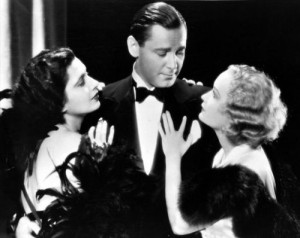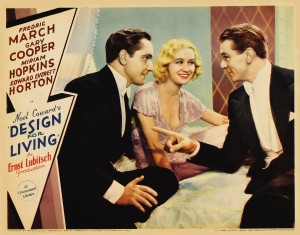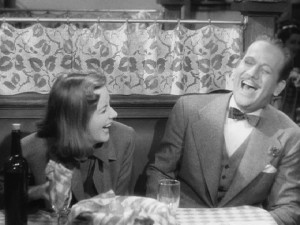Red roses, paper hearts and pink, pudgy teddy bears. Valentine’s Day may have come and gone, but fear not. For those of you still in a romantic mood, might I suggest the work of legendary writer-director Ernst Lubitsch? Sly and sophisticated, the German émigré’s films offer an irresistible concoction of wit and intelligence- all delivered with a deft touch.

It must be the most marvellous supper. We may not eat it, but it must be marvelous.
The cinematic equivalent of champagne, caviar and a candlelit dinner for two, Trouble in Paradise is an incomparable jewel of Hollywood’s Golden Age. Debonair thief Gaston Monescu (Herbert Marshall) falls for fellow crook Lily (Miriam Hopkins), but has difficulty resisting the charms of their newest mark, Madame Colet (Kay Francis)- whom will he choose?
Lubitsch solves the conundrum with characteristic élan. Laced with insouciant humour and innuendo, the film revels in the freedom of pre-code Hollywood: Lily and Gaston substitute seduction with ecstatic pickpocketing; a series of clocks teasingly signifies Gaston succumbing to Colet. Marshall, Hopkins and Francis are a delightful, pitch-perfect trio, effortlessly inhabiting a chic art deco fantasy as sophisticated and beguiling as their performances.
Theft has never seemed more alluring.

Boys, it’s the only thing we can do. Let’s forget sex.
Except of course, they can’t. Design for Living is the playful story of a very modern ménage à trios. Gilda (Miriam Hopkins) meets fellow Americans in Paris, Tom (Fredric March) and George (Gary Cooper), and falls blissfully in love with both men. She cannot choose between them and neither man is willing to risk his friendship with the other, so Gilda proposes a ‘gentleman’s agreement’: she will live with Tom and George- fostering their respective careers as a playwright and painter- but there must be no romance of any sort. Unfortunately, Gilda is no gentleman…
Miriam Hopkins is something of an acquired taste. Her acting was often mannered and she had a tendency towards melodrama which I sometimes find grating. Yet whenever she worked with Lubitsch, she shone. As Gilda, Hopkins must be bold enough to leap head first into life as a Bohemian ‘Mother of the Arts’, yet also bewitching enough to have not just Tom and George, but stuffy old Max (Edward Everett Horton) pining after her. She succeeds effortlessly. March and Cooper are such a wonderful double act too, that I would gladly have watched a buddy comedy about their escapades before they even met Gilda.

Ninotchka, it’s midnight. One half of Paris is making love to the other half.
Garbo laughs indeed. Three Russians arrive in Paris intent on selling jewellery confiscated from the aristocracy during the Revolution. Grand Duchess Swana (Ina Claire) sends her friend Count d’Algout (Mervyn Douglas) to retrieve her property. Confused by the ensuing delay, Moscow despatches top operative Nina Ivanovna ‘Ninotchka’ Yakushova (Greta Garbo) to deal with the problem. She may be as stern as ice, but she thaws as she slowly falls in love with d’Algout.
Part satire, part romance, Ninotchka was the first Lubitsch film I fell for. I have yet to recover.
Despite the movie’s tagline, it wasn’t the first time Garbo had laughed onscreen (see Queen Christina), but it was a rare comedic outing for her and one she clearly enjoyed. She intones such lines as, “The last mass trials were a great success. There are going to be fewer but better Russians” with great gravity and sincerity- tweaking her image for all it’s worth. Douglas is very dashing and the film even includes Bela Lugosi (yes, Dracula himself) as Ninotchka’s boss. What more could you want?
Leave a Reply